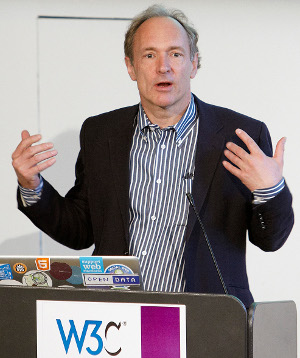Berners-Lee, BBC, Vodafone focus on web's potential

How the World Wide Web Consortium is developing the web of the future...

Tim Berners-Lee believes the World Wide Web Consortium is critical to future developmentsPhoto: W3C
With the web becoming increasingly important to business, culture and society every day, the future development of cyberspace is something that we all have an interest in.
Worldwide web founder Sir Tim Berners-Lee clearly wants to play a role in the development of his invention and leads the World Wide Web Consortium (W3C) in its efforts to help the web reach its full potential.
Set up in 1994, the W3C is a community where member organisations - such as Apple, the BBC, Facebook and Vodafone - work together to develop web standards and guidelines to form the basis of the future development of the web.
Berners-Lee and members of the BBC and Vodafone recently discussed their work with W3C and how they hope to improve the web at an event organised by internet registry for the .uk domain names Nominet, which is hosting W3C's new offices in Oxford.
Evolving challenges for W3C
Berners-Lee - who developed the hypertext mark-up language that links information together to form the web - said the web is still changing, which is presenting the W3C with a range of challenges.
"The consortium was fundamentally necessary for the technical development of the web. We have to have a place where industry can come together and discuss protocols," he said.
One of the reasons for these challenges, according to Berners-Lee, is the internet has developed significantly from its initial incarnation. "This web started off being an information space - now it's got this other role as a platform that people use for all sorts of things," he said.
One of these things is Twitter, the true value of which Berners-Lee said would become clear if it could be organised into "a place for reasoned debate".
Berners-Lee said powerful web applications are needed to help the web fulfil its potential as somewhere for scientists to use as a creative space. "A web that supports that kind of thing is very important," he said.
And because of the nature of the web, these web applications can have a significant impact. "The real challenge of web science is when we design a little system, how big is the effect?" Berners-Lee said.
BBC on accessibility and creating a public digital arena
The BBC is an active member of the W3C and is looking at how it can tackle some of the issues raised by Berners-Lee.
BBC head of future media Ralph Rivera said he believes the web can become a...
...digital public space supporting the BBC's vision of a new broadcast system based on "social, interactive and non-linear" tools.
"To me, there is no more important a public space than the web," he said.
He added that the fragmentation of web protocols needs to be addressed so the web can support the different technologies being deployed, such as semantic web and identity management.
"We stand committed to support and contribute to the standards," he said.
Rivera added that bodies such as the W3C are essential for opening up the web ecosystem to the public and content creators - something the BBC is also aiming to do with projects such as its digital content archive.
BBC R&D project director Dr Adrian Woolard added that the development of the web is critical for the BBC's future. "We believe we're at the cusp of what we say is a new broadcasting system. We need to make it real and build it," he said.
This new broadcasting system encompasses hybrid content distribution, greater use of metadata, social networking and accessibility to all kinds of audiences.
Woolard is working with W3C to work out how to cater for people who have trouble accessing services in conventional ways.
He said the BBC is "very acutely aware that the audience is changing" due to factors such as an ageing population. He said the BBC's mission to help people get the most out of the changing media is therefore increasingly important.
Woolard added that a lot of additional functionality needs to be embedded web interfaces. "Personalisation is required for people with different needs than the norm," he said.
In the case of the BBC, this personalised functionality includes alternative audio, which cuts out background music and noise for people with hearing difficulties, and an iPhone app that provides audio description.
Vodafone's views on having an impact on the future of the web
Vodafone is another active member of the W3C and senior technologist in Vodafone R&D Daniel Appelquist explained the company does a lot of work associated with mobile web standards and industry engagement.
Appelquist said the W3C was a community where openness, visibility and vision were major features. He described the body as a "neutral ground where we can sit down with our competitors to improve the industry".
"It's a place where technical work gets done but also we are exposed to a multiplicity of new points. It's a place where that community flourishes," Appelquist said.
This technical work includes creating a roadmap for the development of HTML5, something that would have real impact on the future direction of the web. "Having an impact is a key part of operating in the W3C," Appelquist said.
Vodafone was instrumental in the setting up of the W3C's mobile working group which has made progress with developing standards for mobile applications, APIs and the social web.